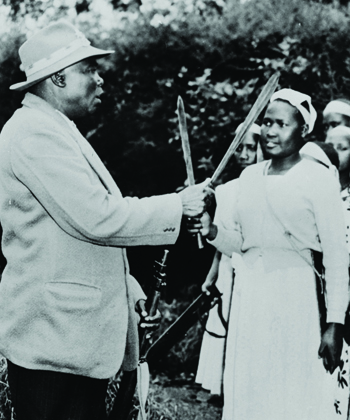PORTRAIT Wanjiku of Kenya: An Ordinary Woman in Extraordinary Times
Born in 1910 among the Gikuyu people of East Africa, Wanjiku witnessed almost the entire twentieth century.30 Her life encompassed the dramatic intrusion of British colonialism, the coming of Christianity, the Mau Mau rebellion against European rule, the achievement of independence for Kenya in 1963, and the challenges of modernization in the decades that followed.
And yet, the first 30 years or more of Wanjiku’s life were shaped far more by the customary patterns of rural Gikuyu culture than by the transformations of colonial rule. She grew up in her father’s compound where her mother, three other wives, and more than a dozen children also lived. As a child, she began contributing to the household—fetching water, firewood, and vegetables—even as she learned the stories, riddles, and proverbs of Gikuyu folklore. At age fourteen, she had her ears pierced, thus achieving a “new stage of maturity.”
Far more important, however, was her “circumcision,” a procedure that involved the cutting of her genitals and the excision of the clitoris. For Wanjiku, as for virtually all Gikuyu girls, this procedure was a prerequisite for becoming “a grown-up person” and eligible for marriage. Described as “buying maturity with pain,” the operation was, as Wanjiku later recalled, “like being slaughtered.” Circumcision also marked Wanjiku’s entry into an age-set, a group of girls who had undergone this initiation into womanhood together. As adults they worked together in the fields, provided help and gifts at the birth of children, and protected one another from sexual abuse by men.

Now Wanjiku was also able to attend the evening dances where young men and women mingled. There she met her first husband, Wamai, who initiated the long process of negotiation between families and the payment of numerous goats and cows to the bride’s father. Marriage, she found, “was a big change—learning about sex and my husband’s habits.” Tragedy struck, however, when both her husband and her first child died. A few years later, Wanjiku married Kamau, the younger brother of her first husband, with whom she had three sons. Her second marriage, unlike the first, was accompanied by a church service and a wedding ring, signs of encroaching Western culture. Both marriages were apparently relatively satisfying, and she reported with pride that neither man mistreated or beat her.
During the 1940s and 1950s, the new realities of colonial life began to touch Wanjiku more personally than before. She and Kamau became Christians around 1940, and in 1948, Wanjiku “became saved.” “The saved ones,” she declared, “do not take tobacco nor drink. And they don’t abuse anybody.” She then joined a church-based “Mother’s Union,” vowing “never again to carry out old Gikuyu customs.” For Wanjiku, this group became a major source of social support that operated outside of traditional Gikuyu culture.
In 1952, Wanjiku found herself caught up in the Gikuyu-based Mau Mau rebellion against colonial rule. To separate the general population from the Mau Mau “freedom fighters” in the surrounding forests, the colonial government forced most Gikuyu to relocate into compact villages closely and brutally supervised by the Home Guard, local African police appointed by European authorities. Wanjiku and many others were required to dig a large trench around the village to keep the rebels out. “We were like prisoners,” Wanjiku reported. “If we started to drag behind working, we were beaten.” Caught between the opposing forces of the Home Guard and the Mau Mau fighters, Wanjiku lived in fear. “If you made a mistake with the Home Guard, you would die. If you made a mistake with the Mau Mau, you would die too.”
The British crushed the Mau Mau rebellion by 1956, but, by 1963 Kenya, like dozens of other African countries, had achieved its independence. Wanjiku remembered the day with exhilaration. “We spent the whole night singing and dancing. We were so happy because we would never be ruled by foreigners again. It also meant the end of the beatings.” It was perhaps the high point of Wanjiku’s consciousness as a public person and a participant in a new nation.
In the decades following independence, Wanjiku experienced still further changes. She and her husband began to grow tea as a cash crop, something limited to European farmers for much of the colonial era. Kenya’s new government tried to forbid female circumcision, and, as young people were increasingly drawn to the larger cities, older rural social patterns broke down. Boys and girls of different age-sets mingled far more freely than before. Educated young people felt superior and sometimes behaved disrespectfully to illiterate elders such as Wanjiku.
By the 1990s, Wanjiku was an old woman afflicted with arthritis and much diminished vision. She saw herself less as a Kenyan than as a Gikuyu. No longer able to farm, she counseled her children, looked after her grandchildren, and enjoyed recounting her life story to a visiting anthropologist.
Question
Question: How does Wanjiku’s life reflect both the continuities and changes of the twentieth century in African history?